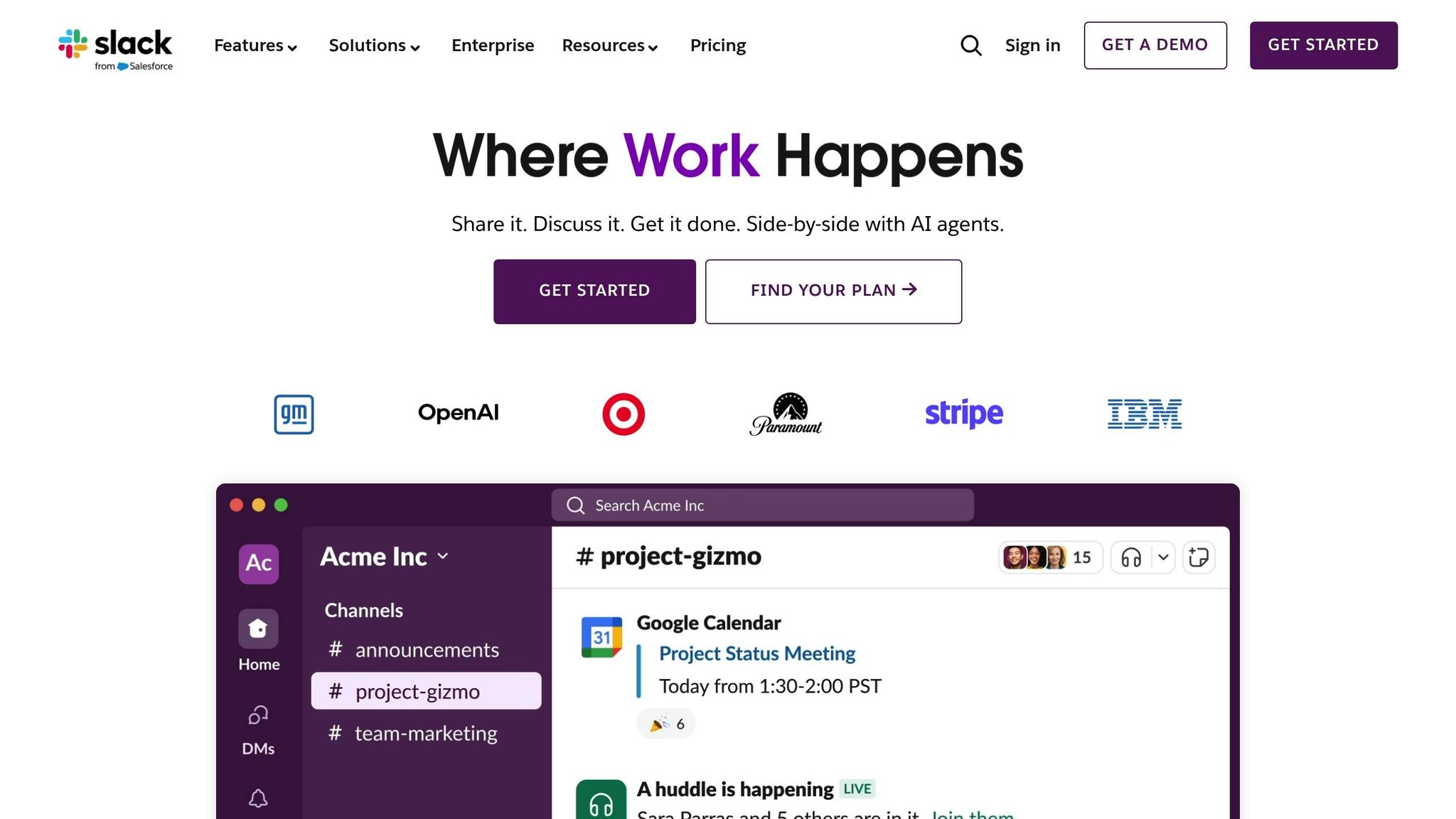- Processes unstructured data: NLP analyzes large volumes of text like financial statements, earnings calls, and regulatory filings to extract key insights.
- Reduces errors: Automates data extraction, cross-checking, and flagging inconsistencies for more reliable reports.
- Saves time: Summarizes lengthy documents in minutes, replacing hours of manual work.
- Provides real-time insights: Tracks live data from markets, news, and internal systems for instant feedback.
- Simplifies compliance: Scans contracts and filings to detect risks and ensure regulatory adherence.
- Improves investor communication: Generates polished, investor-ready reports with clear narratives and visualizations.
NLP tools like Lucid Financials combine automation with expert review, offering startups a way to keep up with financial complexities while focusing on growth.
How Is Natural Language Processing Used In Finance? - BusinessGuide360.com
Main Problems NLP Solves in Financial Reporting
NLP addresses some of the toughest challenges finance teams in startups face. By automating intricate tasks and reducing human errors, it reshapes how financial data and reports are managed. This technology improves data extraction, enhances accuracy, and speeds up reporting, making it a game-changer for startups navigating financial complexities.
Automating Data Extraction and Analysis
Startups deal with an overwhelming amount of financial data, and manually processing it is no longer practical. NLP systems can handle both structured and unstructured data - like earnings call transcripts, regulatory filings, and market updates - by pinpointing relevant details, extracting key metrics, and summarizing them into actionable insights.
Named Entity Recognition (NER) and relationship mapping play a key role in identifying important financial elements and their connections. This helps with tasks like risk assessment and spotting new opportunities. For instance, NLP tools can quickly scan hundreds of earnings call transcripts to identify sentiment changes or flag potential risks, saving analysts hours of work and reducing the chance of errors.
NLP can summarize lengthy documents in minutes, a task that might otherwise take hours - or even days. For startups working against tight investor deadlines, this speed is invaluable. Instead of manually sifting through piles of documents to find performance indicators or risk factors, NLP does the heavy lifting. By automatically categorizing critical information from sources like customer communications, contracts, and market updates, it generates comprehensive financial summaries in a fraction of the time it would take human analysts.
Improving Data Accuracy and Reducing Errors
Even the most skilled professionals can overlook details when processing large volumes of financial documents under pressure. NLP steps in to standardize how financial language is interpreted, flag inconsistencies, and cross-check data from multiple sources. This minimizes the chances of errors or omissions, ensuring more reliable reporting.
For example, NLP can identify discrepancies in regulatory filings or financial statements by analyzing language patterns and numerical data side by side, ensuring nothing slips through the cracks. This is especially helpful for startups, which may lack experienced finance teams. By ensuring that financial terminology is interpreted consistently across reports, NLP eliminates variations that often arise when different people handle similar tasks. It also flags potential errors early, giving teams time to address them before presenting reports to investors.
By automating data verification, NLP not only enhances accuracy but also speeds up the process, allowing startups to focus on more strategic financial planning and analysis.
Enabling Real-Time Financial Insights
NLP doesn't just improve data extraction and accuracy - it also transforms how quickly financial insights become available. Traditional financial reporting often works on monthly or quarterly timelines, leaving startups without critical information in between. NLP changes this by analyzing live data streams from market updates, news sources, and internal systems, delivering instant feedback on key financial metrics.
With this real-time capability, startups can react swiftly to market shifts, investor questions, or compliance concerns, enabling more agile decision-making. Sentiment analysis powered by NLP further enhances this by gauging market trends and investor sentiment through sources like news articles, social media, and earnings calls.
The growing volume of unstructured financial data makes manual review increasingly impractical and expensive. NLP processes this continuous influx of information, identifying trends and anomalies as they happen - not weeks later. This means startups gain access to crucial financial intelligence exactly when they need it most.
For example, NLP can help detect sudden changes in market sentiment that might affect fundraising efforts or spot cash flow issues before they escalate. It acts as an early warning system, giving startups the tools they need to navigate unpredictable markets.
How NLP is Used in Financial Reporting
Natural Language Processing (NLP) is reshaping how financial reporting is done. From creating polished investor materials to keeping tabs on regulatory compliance, NLP-driven tools bring speed, precision, and deeper insights to the table. These advancements give startups and smaller companies access to powerful tools that help them compete more effectively. Let’s take a closer look at how NLP simplifies investor reporting, market analysis, and compliance.
Automated Creation of Investor-Ready Reports
Natural Language Generation (NLG) transforms raw financial data into clear, professional narratives that are easy for investors to digest. These systems can instantly generate summaries focused on trends, ensuring reports are consistent and free of errors. For startups working under tight deadlines, this ability to produce daily or quarterly updates with a polished tone is a game changer.
But it doesn’t stop at summaries. AI-powered tools can create detailed financial plans for multiple scenarios, helping businesses make smarter decisions. These platforms can even pull in industry benchmarks automatically, providing key metrics like Customer Acquisition Cost (CAC), valuation comparisons, and competitor insights - all without extra manual research. Tasks that used to take days can now be completed in minutes, making financial management up to 100 times faster.
Market Sentiment and Risk Analysis
After generating narratives, NLP enhances decision-making by analyzing market sentiment and identifying risks in real time. It’s particularly good at sifting through massive amounts of unstructured data to uncover trends and gauge investor sentiment. By processing earnings call transcripts, financial news, regulatory filings, analyst reports, and even social media posts, NLP tools can evaluate tone and context to provide actionable insights.
For startups, this means understanding how market conditions might affect fundraising or business growth. Positive sentiment in news or social media can highlight opportunities, while negative sentiment can reveal risks that need immediate attention.
NLP systems can also analyze hundreds of earnings call transcripts at once, making real-time sentiment analysis a staple in investment and risk management decisions. These tools monitor news feeds, social media, and regulatory updates, sending instant alerts when there are significant changes. Additionally, Entity Recognition (NER) helps pinpoint key financial elements like company names, dates, and monetary values, even if they appear in different formats, ensuring more precise analysis.
Regulatory Compliance and Risk Detection
NLP simplifies compliance by scanning filings, contracts, and policies to flag potential issues or risky language. This automation not only minimizes human error but also speeds up compliance checks by highlighting areas that need further review. For startups navigating complex regulations, NLP acts as a safeguard, catching potential risks before they turn into costly problems. By analyzing both text and numerical data, it can spot inconsistencies in filings or financial statements, ensuring nothing is overlooked.
Financial institutions use NLP to review loan agreements for risky terms and to ensure compliance with new regulations. Startups benefit from the same capabilities when reviewing contracts, partnership agreements, or financial disclosures. During times of regulatory change, NLP tools can quickly scan existing documents to identify sections that need updates, making it easier to stay compliant without lengthy manual reviews. Regular updates to NLP models and strong data management practices further ensure accuracy and reliability over time.
sbb-itb-17e8ec9
How Lucid Financials Uses NLP for Startups

Lucid Financials has taken a proactive approach to integrating natural language processing (NLP) into its platform, specifically targeting startups and rapidly growing companies. By blending AI-driven automation with human expertise, Lucid offers the speed and precision these businesses need while maintaining a high level of reliability. This combination not only addresses the immediate needs of startups but also opens the door to more advanced solutions in areas like investor communication and compliance.
Real-Time Financial Insights Through Slack

One standout feature of Lucid Financials is its Slack integration, which completely changes how startup teams interact with their financial data. Instead of navigating through multiple dashboards or waiting for monthly updates, users can simply ask questions in plain English and receive instant, actionable responses directly in Slack.
The platform is designed to handle a wide range of financial queries, from cash flow and burn rate to revenue trends and projections. For example, a founder might ask, "What were our operating expenses for Q3?" and receive a detailed response complete with charts and breakdowns. This makes it incredibly easy to access key financial insights without needing specialized knowledge or software.
This functionality is especially useful for team members who aren’t financial experts. Sales leaders can quickly check revenue numbers, operations managers can review expense categories, and founders can monitor their cash runway - all within their primary communication tool. The system also generates custom reports on demand and flags financial anomalies, helping teams identify and address potential issues early on.
Automated Investor-Ready Reports and Forecasts
Lucid doesn’t just provide quick insights - it also transforms how startups prepare and share financial data with investors. Using NLP, the platform can automatically extract and summarize financial data into professional, board-ready reports. These reports include standardized metrics, narrative explanations, and polished visualizations, making them ideal for investor presentations and fundraising efforts.
One of the platform's key advantages is its speed. Startups can produce accurate financial reports in just seven days, a significant improvement over traditional timelines that often take weeks. This is especially critical during fundraising rounds, where up-to-date documentation can make or break an investor’s decision. The platform delivers everything from financial statements and cash flow analyses to growth forecasts, all formatted to meet investor expectations.
For instance, a SaaS startup recently used Lucid to prepare for their Series B funding round. With Lucid’s automated reporting tools, they quickly generated all the necessary financial documents. The reports included plain-language explanations of key metrics and trends, which simplified the due diligence process and helped secure funding faster.
Lucid also tailors its outputs to meet U.S. standards. Reports use proper dollar symbols, MM/DD/YYYY date formats, and comma-separated numbers, all while adhering to U.S. GAAP standards. This ensures the documents are fully aligned with American business practices, tax codes, and reporting requirements - making them highly relevant for U.S.-based startups and their investors.
AI-Powered Accuracy with Human Review
Lucid combines the efficiency of NLP automation with the reliability of expert human oversight. After the AI generates financial reports and insights, a team of experienced professionals reviews the content to ensure accuracy, compliance, and contextual relevance. This two-step process offers the best of both worlds: speed from automation and trustworthiness from human expertise.
The platform processes large amounts of data from various sources, including accounting software, bank feeds, payroll systems, and expense management tools. While the NLP system handles the heavy lifting, human reviewers step in to catch subtle errors, interpret ambiguous data, and ensure compliance with complex regulations. This hybrid approach not only reduces turnaround times but also ensures a level of precision that startups and their investors can rely on.
"The platform saves us hours every month, and their expert team makes sure nothing slips through the cracks." - Refael Shamir, Founder and CEO @Letos
This dual-layer system is particularly valuable during high-stakes moments like board meetings and investor presentations. Founders report feeling more confident in their financial data and better equipped to make timely decisions. By combining AI-driven efficiency with human oversight, Lucid allows startup teams to focus on growth rather than worrying about the accuracy of their financial reports.
Moreover, Lucid aggregates both structured and unstructured data to provide a complete picture of a startup's financial health. By connecting to various data sources and applying NLP analysis, the platform offers deeper insights than traditional accounting tools, empowering startups to make smarter, more strategic decisions as they scale.
The Future of Financial Reporting with NLP
As businesses continue to embrace the benefits of NLP, the future of financial reporting is poised for even more transformative changes. For startups and growing companies, this evolution marks a significant shift in how financial data is accessed, interpreted, and acted upon.
Speed is taking center stage. NLP-powered tools are revolutionizing financial management, completing tasks up to 100 times faster than traditional methods. What once took weeks can now be accomplished in mere minutes. For example, quarterly report analyses that previously demanded days of manual effort are now completed in minutes. This newfound efficiency allows financial teams to dedicate more time to strategic planning rather than routine data crunching.
Accuracy is reaching new heights. Automation through NLP not only slashes reporting time by up to 80% but also reduces error rates by over 50%. Features like automated cross-checking, data validation, and compliance monitoring significantly lower the likelihood of human error, ensuring more reliable financial reporting.
Financial insights are becoming more accessible. NLP simplifies complex financial data into plain language, making it easier for teams across an organization to understand and act on key insights. This eliminates the need for specialized accounting expertise and encourages more informed, company-wide decision-making.
Experts predict that as NLP technology advances, it will become a staple for startups, offering real-time, customized insights and automated compliance solutions. With these improvements, financial reporting will only become more streamlined and accessible.
Real-time reporting is set to replace periodic updates. Companies like Lucid Financials are already demonstrating the potential of real-time NLP integrations. Future platforms aim to process massive amounts of financial data daily, delivering instant insights. This shift means startups will no longer be confined to periodic reviews. Instead, they’ll have continuous visibility into critical metrics like burn rates, runway calculations, and performance indicators - enabling proactive management rather than reactive decision-making.
For startups already leveraging NLP, the next wave of financial reporting tools will combine real-time insights with advanced strategic capabilities. Starting at $150 per month, these platforms offer seamless integration into existing workflows while delivering unmatched speed and reliability. In today’s competitive landscape, adopting NLP for financial reporting isn’t just an advantage - it’s becoming a necessity for staying ahead.
FAQs
How does NLP improve the accuracy and efficiency of financial reporting for startups?
Natural Language Processing (NLP) is transforming financial reporting by automating intricate tasks like data interpretation. It minimizes human error, accelerates processes, and makes analyzing unstructured financial data more efficient. The result? Reports that are not only clearer but also packed with actionable insights.
For startups, this technology translates into quicker decisions and smarter resource management. Tools like Lucid Financials harness advanced AI to merge these advantages with expert guidance, equipping growing businesses with the resources they need to stay competitive while ensuring their financials are accurate and ready for investors.
How does NLP deliver real-time financial insights for better decision-making?
Natural Language Processing (NLP) is reshaping financial reporting by making it faster and more efficient to analyze and interpret massive amounts of data. It can pull out key insights, spot trends, and flag unusual patterns in real time. This means businesses can make quicker, more accurate decisions based on solid data.
NLP also takes care of time-consuming tasks like creating investor-ready reports, summarizing financial statements, and answering detailed questions about a company's performance. By automating these processes, companies not only save time but also ensure their reports are consistent and accurate. This allows business leaders to focus on strategic growth with confidence in the reliability of their financial data.
How does Lucid Financials use NLP to improve investor communication and ensure regulatory compliance for startups?
Lucid Financials uses natural language processing (NLP) to make financial reporting easier and more effective for startups. By automating how data is interpreted, it delivers accurate, easy-to-understand, and real-time insights, enabling founders to make decisions faster and with greater confidence.
Through NLP, Lucid Financials simplifies investor communication by creating investor-ready reports that are both clear and always up-to-date. It also helps startups meet regulatory standards by spotting potential discrepancies and ensuring precise reporting. This not only saves time but also minimizes the chances of costly errors.
By combining smart automation with expert guidance, Lucid Financials allows startups to concentrate on scaling their business, knowing their financial data is managed with accuracy and care.


